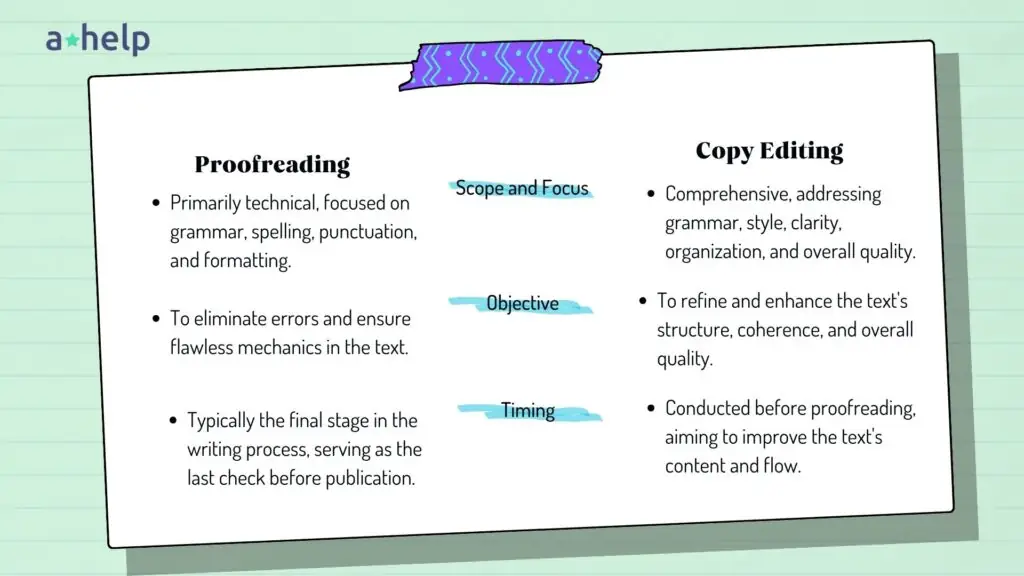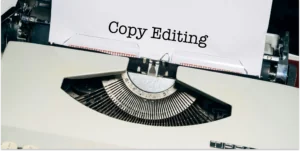Ensuring the quality and accuracy of written content is paramount both in writing and publishing. Two essential processes, often mistaken for one another, play distinct yet complementary roles in achieving this goal: copy editing and proofreading. The key difference, however, lies in the fact that copy editing addresses structure, clarity, and accuracy, while proofreading deals more with grammar, spelling, and punctuation. Read on, as we will further explore the unique functions, key responsibilities, and instances when each is indispensable.

✅ AI Essay Writer ✅ AI Detector ✅ Plagchecker ✅ Paraphraser
✅ Summarizer ✅ Citation Generator
What is Copy Editing?
Copy editing is a process focused on elevating the overall quality of a written piece. It includes a range of objectives, such as addressing issues related to grammar, style, and coherence. The primary goal of copy editing is to refine and enhance the clarity, consistency, and organization of the text.
| Responsibilities of a Copy Editor |
|---|
| 1. Reviewing the text for grammatical errors, syntax issues, and spelling mistakes. |
| 2. Making sure the consistency of writing style throughout the document, including proper tone and voice. |
| 3. Addressing concerns related to the flow and coherence of the content, making necessary adjustments to enhance readability. |
Copy editing is called for in various scenarios. When crafting a compelling marketing campaign, a copy editor checks the promotional materials so they are not only error-free but also resonate with the target audience. In academic writing, copy editing guarantees that research papers are coherent, well-structured, and adhere to specific style guides. Additionally, copy editing proves invaluable in the realm of publishing, where it enhances the readability and overall impact of books and articles.
What is Proofreading?
Proofreading, on the other hand, is a review process primarily focused on removing errors in grammar, spelling, punctuation, and formatting. While copy editing offers a broader spectrum of improvements, proofreading is the final line of defense against imperfections in a text.
| Responsibilities of a Proofreader |
|---|
| 1. Scouring the text for typographical errors, misspellings, and grammatical mistakes. |
| 2. Ensuring that the document adheres to consistent formatting, maintaining uniformity in elements such as fonts, spacing, and margins. |
| 3. Rectifying any inconsistencies in punctuation, and correcting placement of commas, semicolons, and quotation marks. |
Proofreading is essential, especially in journalism. There, proofreaders play a critical role in making news articles error-free and maintaining the credibility and professionalism of the publication. In legal documents, the scrutiny of proofreaders is vital to avoid misunderstandings that can have legal consequences. Additionally, proofreading is indispensable in academic writing, where it guards the integrity and precision of scholarly work.
Differences Between Copy Editing and Proofreading
While both copy editing and proofreading share the objective of enhancing the quality of written content, they differ in scope and focus. Copy editing addresses issues related to grammar, style, clarity, and organization. It aims to refine the overall structure and coherence of the text. In contrast, proofreading is primarily concerned with eliminating errors in grammar, spelling, punctuation, and formatting. It is the final check to ensure that the content is flawless in terms of mechanics.

Conclusion
Both roles of copy editing and proofreading are needed. Copy editing elevates the quality and coherence of content while proofreading ensures its accuracy and perfection. Understanding the distinctions between these two processes is vital for writers, editors, and publishers alike. By embracing the unique contributions of both disciplines, we can craft written materials that convey messages effectively as well as leave a lasting impression of professionalism and excellence.
FAQ
Follow us on Reddit for more insights and updates.




Comments (0)
Welcome to A*Help comments!
We’re all about debate and discussion at A*Help.
We value the diverse opinions of users, so you may find points of view that you don’t agree with. And that’s cool. However, there are certain things we’re not OK with: attempts to manipulate our data in any way, for example, or the posting of discriminative, offensive, hateful, or disparaging material.